
views
Drink green tea.

It’s a natural appetite suppressant. When you feel yourself getting hungry, make a hot cup of green tea. You’ll notice that your hunger lessens and your energy levels get higher. Green teas include any teas that have not gone through the oxidation process. They are higher in powerful antioxidants called polyphenols. Avoid adding sweeteners (such as sugar, honey or artificial sweeteners) to green tea to maximize the effect of appetite suppressant.
Drink a glass of water.

When you feel hungry, you might actually be dehydrated. If you start feeling like you want a snack, drink a full glass of water first. Some studies suggest that drinking water before a meal can make you feel fuller faster, too. While drinking water is a good way to curb hunger, drinking sugary drinks isn’t. Sodas and juice can give you a blood sugar spike and then crash, which can really mess with your appetite. By drinking a glass of water, you're allowing yourself time to notice if you're genuinely hungry or if you're feeling hungry because of your emotions. If plain water isn't your favorite, try drinking sparkling or carbonated water instead.
Try deep breathing.

Cleansing breaths can help stop your hunger pangs. Take a deep breath in through your nose and let it out through your mouth. Do this 5 to 10 more times, and try to focus solely on your breathing the whole time. If you weren’t that hungry to begin with, deep breathing can help you move on from the sensation.
Get some exercise.
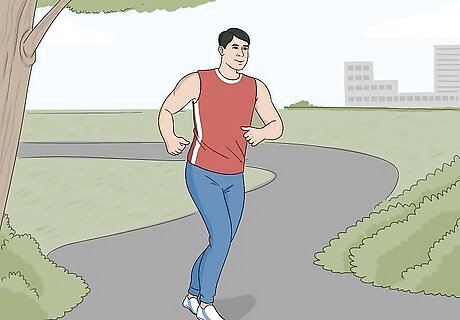
Keep your mind focused elsewhere while getting in shape. Try doing something aerobic, like a fast walk, a jog, or a swim session. If your hunger pains are caused by stress, exercising can get rid of them fast. Exercise also releases endorphins that will help combat stress and can boost your mood.
Put off eating for 5 minutes.
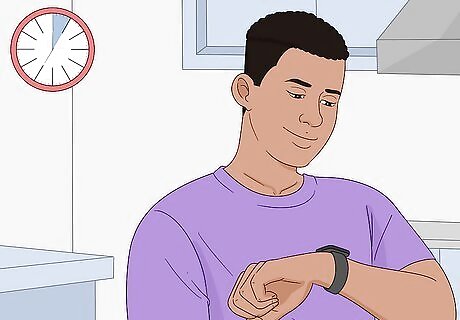
Just tell yourself to wait. While you’re waiting, check in with yourself to see if you’re really hungry. If you aren’t, try to go even longer: put off eating for 10 minutes, then 20 minutes. Before you know it, your hunger craving will have passed. You can trick your brain into thinking that you’re going to eat in just a minute. It can help settle your stomach and keep your hunger pains from getting too bad.
Call a friend.

Distract yourself with a good conversation. If you feel yourself getting hungry, call up your best friend or a family member. When you chat with someone over the phone, you’re less likely to think about how hungry you are. Texting is okay, but it’s not as distracting as a phone call. If you can, try actually calling them on the phone or chatting via video chat.
Listen to a podcast.
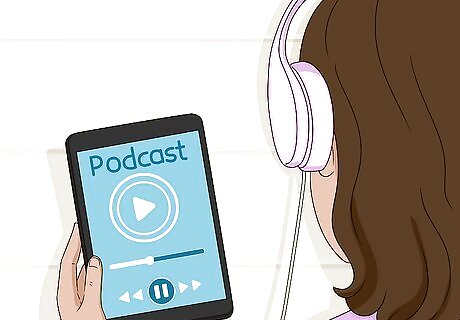
They’re more distracting than listening to music. Plug in your headphones and pull up a podcast that you love to listen to. Focus on what the people are saying and how they’re saying it to redirect your mind and stop feeling hungry. It might also help to change your scenery. If you were lounging in the living room, head to a porch or go outside for a bit.
Dive into a hobby.

Do something fun that makes you feel good. Practice a musical instrument, get out a fun board game, play video games, or try a new art style. If you can keep your mind off your hunger, you’ll be less tempted to give into your cravings. Try to pick something really engaging. Scrolling on social media is fun, but it won’t really distract your mind.
Practice mindful eating.

Try thinking about what you eat when you eat it. When you sit down for a meal, take away all other distractions, like the TV or your phone. As you chew every bite, really think about the flavor and the texture of the food in your mouth. Chances are, you’ll enjoy it much more, and you’ll probably feel fuller for longer. Research shows that people who were taught mindfulness techniques lowered their levels of stress and chronic anxiety, and their levels of stress eating decreased. This is also a great way to cut down on mindless snacking. If you pay attention to what you eat, you can stop yourself before you eat more than you meant to. Try picking out foods that are more likely to satisfy you, too. For instance, an apple with peanut butter is a much more satisfying snack than a sleeve of crackers.
Keep a food diary.
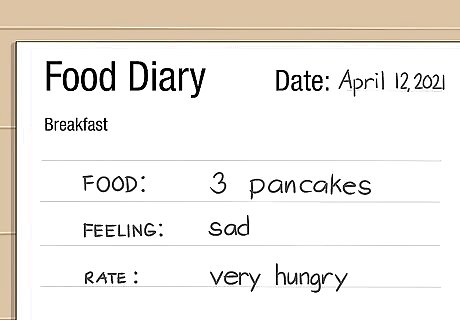
Write down what you eat and when you eat it. Be sure to include how you’re feeling and how hungry you are, too. Take a look back at your journal every week and try to see if there’s any connection between your emotions and your eating. When you recognize those patterns, they’re easier to stop in their tracks. Many people eat because they’re bored, stressed, or anxious. If your food diary shows proof of this, try using other coping mechanisms, like meditation or exercise.
Get enough sleep.

Studies show that sleep deprivation can lead to overeating. Sleep helps you keep a balance of the hormones that make you feel hungry (ghrelin) or full (leptin). Without enough sleep, you'll produce more ghrelin. Your level of leptin will decrease, and this will make you feel hungrier than when you're well-rested. Most people need between 6-10 hours of sleep per night, but it can vary from person to person.
Maintain a balanced diet.
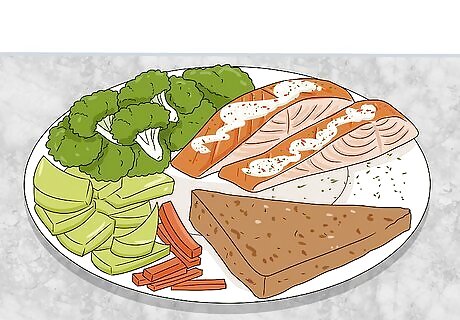
You’ll feel less hungry if your body has enough nutrients. Try to eat 3 balanced meals per day that include fruits, vegetables, lean proteins, and whole grains. Stay away from processed foods and empty calories that can make you feel hungrier over time. A balanced meal includes 1/2 a plate of fruits and vegetables, 1/4 plate of whole grains, 1/4 plate of lean protein, and plant oils in moderation. It’s never a good idea to starve yourself for weight loss purposes. Even if you do lose weight, it’s impossible to maintain, and you’ll be putting your health at risk at the same time. It's normal to feel hungry when your body needs food. If you ignore that feeling for too long, you'll be more likely to binge eat. Instead, it's much healthier to nourish your body with healthy food when you start to feel hungry. Try build your snacks and meals with proteins and healthy fats, healthy fats and carbs, or carbs and proteins.




















Comments
0 comment